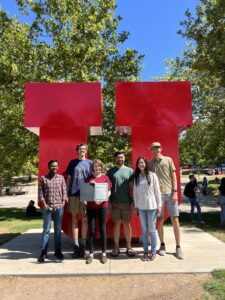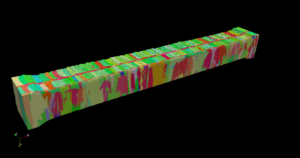 A team of mechanical engineering graduate students from the University of Utah, led by associate professor Ashley Spear, won first place in the National Institute for Standards and Technology (NIST) Additive Manufacturing Benchmark Test Series, a competition that enables teams to test their simulations against additive manufacturing benchmark test data.
A team of mechanical engineering graduate students from the University of Utah, led by associate professor Ashley Spear, won first place in the National Institute for Standards and Technology (NIST) Additive Manufacturing Benchmark Test Series, a competition that enables teams to test their simulations against additive manufacturing benchmark test data.
Spear’s team included graduate students Carter Cocke, Brian Phung, Laura Ziegler, Elliott Marsden, and Vignesh Babu Rao.
In the team’s specific challenge, titled “Subcontinuum Mesoscale Tensile Test,” all the competing teams were given a set of materials characterization data for a small sample of 3D-printed Inconel 625, a type of nickel alloy. They were then asked to make blind predictions of the mechanical (stress-strain) response of the sample under tensile loading without any other knowledge of the mechanical behavior of the material.
 The U team used a modeling technique that allows it to represent the 3D material structure resolved to very small length scales, and it focused on calibrating the material parameters that go into the model. The model allows them to predict how damage evolves and eventually leads to fracture of a given specimen. The team competed against six other groups from around the world.
The U team used a modeling technique that allows it to represent the 3D material structure resolved to very small length scales, and it focused on calibrating the material parameters that go into the model. The model allows them to predict how damage evolves and eventually leads to fracture of a given specimen. The team competed against six other groups from around the world.
“I am very proud of my students for the time and effort they put into the predictions,” Spear said. “They were able to leverage some of the most cutting-edge tools we have in our group, and they even had an opportunity to further extend those tools.”
The awards were presented during an AM Bench 2022 ceremony held on August 17 at the AM Bench 2022 conference in Washington D.C.
This is the second modeling challenge Spear’s group has won related to predicting micromechanical behavior of 3D printed metal. The other competition was hosted by the Air Force Research Lab and America Makes in 2020.